#Ambeth ocampo
Explore tagged Tumblr posts
Text
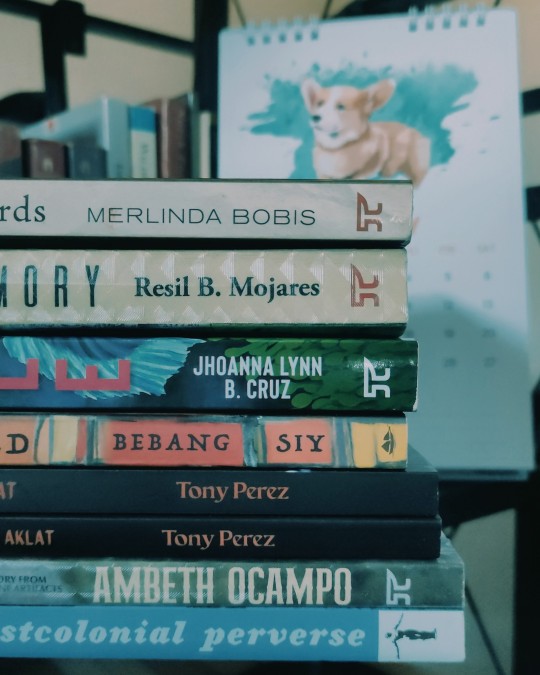


Some Filipino-written books that I want to finish within the first half of the year.
#libro#philippine literature#merlinda bobis#resil mojares#ambeth ocampo#tony perez#jhoanna lynn cruz#bebang siy#j. neil c. garcia
29 notes
·
View notes
Text
Your Week in Books #6
Another week done, another week of things that happened in the book world! This is one of the things I really like doing now because it also keeps me updated on what is going on. Continue reading Your Week in Books #6

View On WordPress
#ambeth ocampo#angie thomas#ateneo de naga university#barnes & noble#bikol book festival#book bans#bts#donald trump#jodi picoult#john green#julia alvarez#kim namjoon#laurie halse anderson#leonard riggio#mary trump#prince harry#rm#rss#rssfeed#spare
3 notes
·
View notes
Text
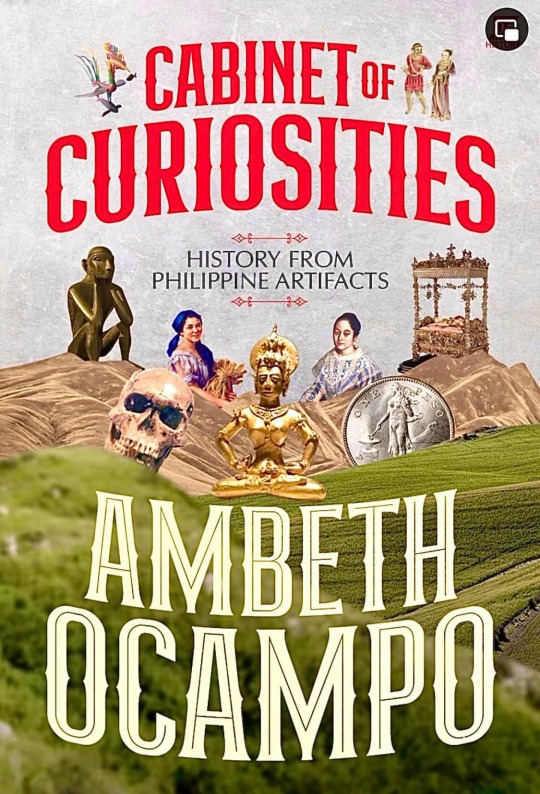
Title: Cabinet of Curiosities: History from Philippine Artifacts
Author: Ambeth Ocampo
Genre/s: nonfiction, history, Philippine history, essays
Content/Trigger Warning/s: brief discussions of war, genocide, colonialism, and imperialism
Summary (from the publisher): “Cabinet of Curiosities: History from Philippine Artifacts” by Ambeth Ocampo takes readers on a captivating journey through Philippine history by exploring a diverse array of 100 artifacts. This collection of essays, inspired by Ocampo’s acclaimed newspaper series, unveils the rich tapestry of the Filipino past through tangible objects that have played significant roles in shaping the nation’s identity.
From prehistoric relics to works of art by renowned Filipino artists, Ocampo’s meticulous research and engaging storytelling bring these artifacts to life, revealing the hidden stories and cultural nuances they carry. The book goes beyond traditional historical narratives, proving that history need not be confined to the written word, as even mute artifacts can provide profound insights into the Filipino experience.
“Cabinet of Curiosities” not only celebrates the Philippines’ cultural heritage but also challenges conventional historical perspectives, making it a must-read for history enthusiasts and those curious about the country’s fascinating past.
Buy Here: https://www.anvilpublishing.com/shop-anv/trade-books/history-culture/cabinet-of-curiosities/
Spoiler-Free Review: Not bad, not bad at all! I guess the overall choppiness of the narrative is attributable to the fact that this is a collection of short essays, but otherwise it’s pretty fun! I liked how it wasn’t just things like statues and coins and jars and such, but included literary works and even a menu. The connections he drew between artifacts, history, and culture make for some very interesting reading, and really live up to his aim of making these “mute” artifacts “speak” in the same way that written history does.
I noted though that he seemed to get a wee bit defensive on the matter of repatriation. He makes a good point about how several of the artifacts he mentions were spared from destruction because they weren’t in the country when the Battle of Manila happened (because the Americans practically leveled the city - it was the second most-devastated city, after Warsaw, at the end of World War II), but at the same time I kind of think this question of repatriation is one that should be revisited and reconsidered in the current period. Maybe not for all artifacts currently out there, but for a few.
I also noted how Ocampo pecked at contemporary political and social issues here and there, wherever they were relevant to a particular artifact. For example, when discussing the Murillo Map that helped bolster the Philippines’ territorial claims against China in the UN arbitral court, he briefly tackles the Philippines’ ongoing dispute with China over the West Philippine Sea. It would have been interesting if he’d been able to expand a bit more on those political ideas, but I also recognize that this book might not be the best place for them; besides, he’s got columns and socmed accounts on which he can expand on his ideas as he wishes.
Another thing that Ocampo points our regularly, especially when discussing precolonial artifacts, are the efforts of local archaeologists to preserve remnants of the Philippines’ past before the colonizers arrived. Between the less-than-ideal preservation conditions and looting both past and present, being an archaeologist in the Philippines is a very difficult and dangerous job, and Ocampo makes note of that in the essays accompanying many of the precolonial artifacts featured in the book. Their persistence and oftentimes downright heroic efforts are the main reason why the enormous gaps in our knowledge of the Philippines’ precolonial past are slowly but surely getting filled in.
So overall, this was a nifty and informative read. While there were times when I wished Ocampo had gone into greater detail and depth into the history of a particular artifact, for the most part the essays were fine on their own as starting points for creating greater interest in Philippine history as a whole.
Rating: four and a half artifacts
#book review#book reviews#cabinet of curiosities#ambeth ocampo#nonfiction#history#essays#philippine literature#philippine history#filipino author#books
6 notes
·
View notes
Text
You know, when I first got Ocampo's new book I was not expecting to read about how he essentially accidentally cursed two museum curators to the point that the both of them became jobless and was left without a museum, with another saying that he was receiving horrible nightmares. All of this because he lended them his anting-anting (Filipino folk amulets) collection for display. After getting them back, he sold everything. Just in case.
#mayaposts#mayapino#ambeth ocampo#cabinet of curiosities#filipino#philippines#filipino folklore#filipino culture#filipino history#anting-anting#amulets
3 notes
·
View notes
Text


Reading Night! ✨
10 notes
·
View notes
Text
"What surprised him was that although he disliked the Spaniards, he was compelled to defend Spain and Europe in front of this annoying American"
- Ambeth R. Ocampo from Rizal Without the Overcoat on Rizal's Anti-Americanism
#jose rizal#ambeth ocampo#philippine history#philippine literature#philippines#colonialism#history#rizal without the overcoat#life and works of rizal#there's so much that could be discussed about this#marge's stuff#college#dark academia#chaotic academia#rizal studies#rizal course
1 note
·
View note
Text
Libreng Lecture ni Ambeth Ocampo
instagram
Kung hindi gumagana ang link na nakalagay sa IG post ni Ambeth Ocampo, mangyari lamang na subukang puntahan ang link na ito.
U-M CSEAS Lecture Series - "Fruit of the Poisonous Tree: The Marcos DiariesAmbeth Ocampo
Mar 11, 2023 07:00 AM
In his haste to evacuate the presidential palace, Malacanang, in February 1986 Ferdinand E. Marcos left behind many papers that included handwritten diaries that cover the years 1969-1984. While the originals are in the custody of the Presidential Commission on Good Government, unofficial copies have been circulating for years. Collating from different manuscript sources, validating and annotating each entry from contemporary newspapers, the Official Gazette, and declassified U.S. State Department records preparing the diaries for publication work is not just an exercise in documentary editing but being critical of Marcos' self-referential and biased view of events. In the light of current rewriting of the first Marcos presidency these documents are double-edged, fruit of the poisonous tree.
#Kalakian#Philippine history#Ambeth ocampo#Marcos#The fruit of the poisonous tree#Marcos diaries#Instagram
1 note
·
View note
Text
I am not stamped by the majority. The herd may go anywhere. I will not go with them.
Teodoro Agoncillo, Talking History: Conversation with Teodoro A. Agoncillo
#philippine history#philippines#kasaysayan#teodoro agoncillo#quotes#history#ph history#ambeth ocampo
0 notes
Photo
I really need to read this.




“If you take the trouble to read a copy of Apolinario Mabini’s La Revolucion Filipina, you will be rewarded with an experience similar to a fistblow on the stomach. One cannot but be disturbed by Mabini’s scathing attack on Emilio Aguinaldo and the way the latter (mis)directed the revolution. If we are still asking questions about the deaths of Andres Bonifacio and Antonio Luna today, it is because Mabini has gone the record to point an accusing finger at Aguinaldo.” – Ambeth R. Ocampo, Mabini’s Ghost
#akin#mabinaldo#heneral luna#heneral moon#apolinario mabini#emilio aguinaldo#ambeth ocampo#ph history#huhuhu#sadt
46 notes
·
View notes
Text
Our Heroes and the ENGLISH language.
It's funny to me that Andres Bonifacio was said to be good in English because he worked in foreign companies. Good for him. But to say that Emilio Aguinaldo was "Not proficient in English" was sus to me because what is the threshold to be called good in English??? This man was exiled in English territories for some time and managed to gather firearms to go back and fight again. I'm pretty sure he learned here and there.
I like it when Bonifacio is recognized, but what if they're just on equal levels when it comes to English, it's just that Aguinaldo biographers hate him as much as Mabini biographers love the sublime paralytic?
Btw, shoutout to Apolinario Mabini who taught himself English while in exile and read Conan Doyle to pass time.
Sources:
[1] [2] [3]
#philippines#filipino#funny#philippine history#apolinario mabini#emilio aguinaldo#andres bonifacio#the source for Miong was britanicca which I kinda do not trust#the source for pole was ambeth ocampo fb post and I trust that with my lofe#chismis of the philippine history
21 notes
·
View notes
Text
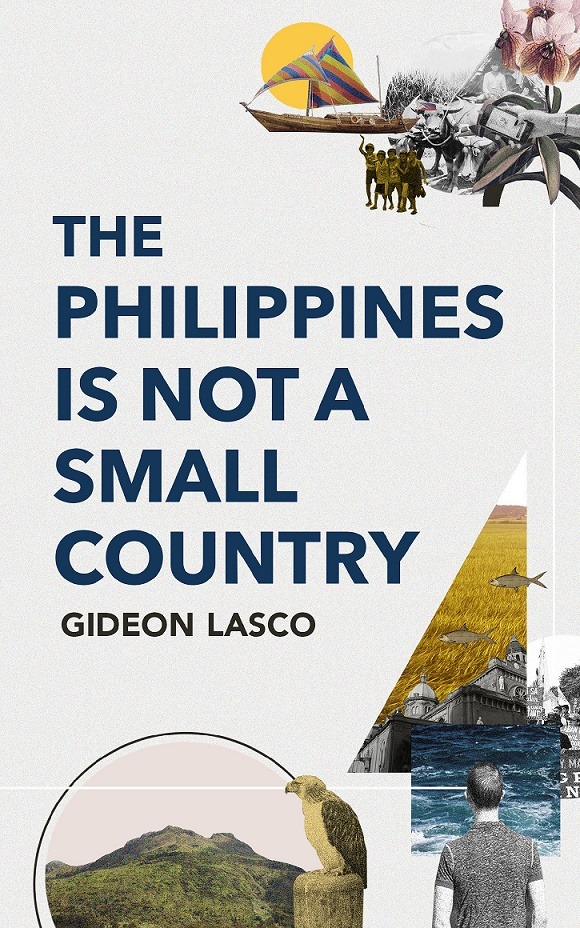
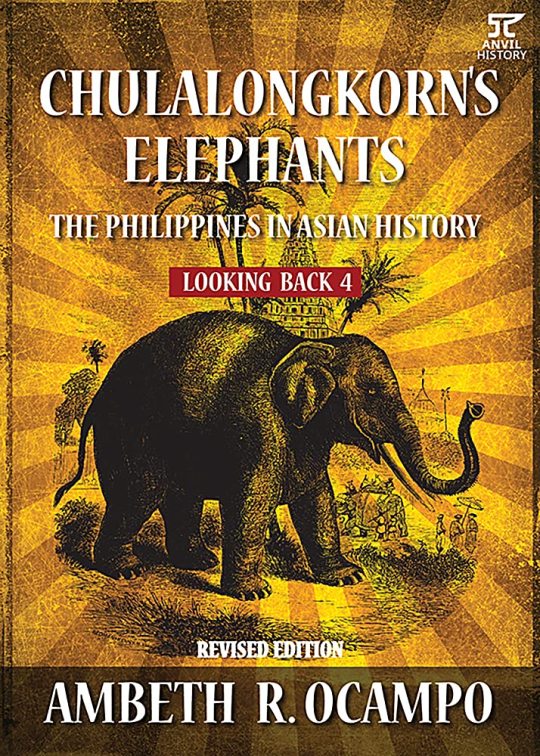
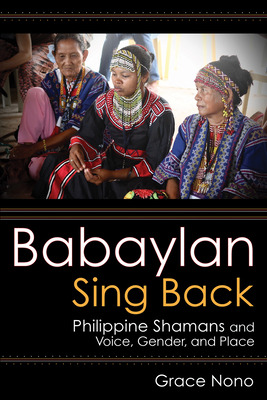
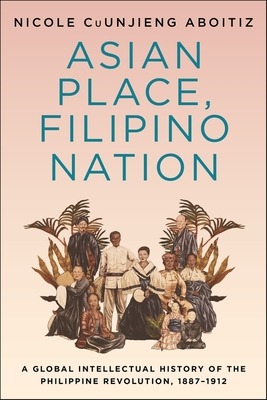
I managed to read 4 books on Filipino culture and history in 2023! Here we have
The Philippines is not a Small Country by Gideon Lasco
Chulalongkorn's Elephants by Ambeth Ocampo
Babaylan Sing Back by Grace Nono
Asian Place, Filipino Nation by Nicole CuUnjieng Aboitiz
All of these are excellent books, and I highly suggest the first three. The last one was bogged down with academic jargon, but still informative.
I keep a bibliography on my website of all the resources I've read on Filipino history/culture in case anyone's interested!
37 notes
·
View notes
Text
Filipinos are not a reading people, and despite the compulsory course on the life and works of Rizal today, from the elementary to the university levels, it is accepted that the Noli me tángere and El Filibusterismo are highly regarded but seldom read (if not totally ignored). Therefore one asks, how can unread novels exert any influence?
Ambeth Ocampo, from "The Matter of Reading Rizal's Novels" in Rizal Without the Overcoat (First Published in 1990, Anvil Publishing Inc.)
24 notes
·
View notes
Text










JOSE RIZAL & ANDRES BONIFACIO
there's a string of fate somewhere in there, right down to the grave
The First Filipino: A Biography of Jose Rizal, Leon Ma. Guerrero • The Religious Character of the Revolution in Cavite, 1896-1897, John N. Schumacher • Jose Rizal: A Man for All Generations, Luis H. Francia • The Philippines: A Past Revisited, From the Spanish Colonization to the Second World War, Renato Constantino • History of the Filipino People, Teodoro A. Agoncillo • Jose Rizal: A Man for All Generations, Luis H. Francia • A Bonifacio pilgrimage, Ambeth R. Ocampo
56 notes
·
View notes
Photo

Who saves the day on a hot afternoon? Your neighborhood sorbetero! In the early 1900s sorbeteros once carried sorbetes balanced on carrying poles*, similar to that of taho today. Around the same time some of the first ice cream shops were being opened by Americans in Manila. It was also around this time that the term “dirty ice cream” was referred to sorbetes, likely by Americans visiting and escaping the heat. Today we continue to enjoy sorbetes, pushed around in colorful, often personalized wooden carts similar to the creativity painted on many jeepneys. Grab a scoop (or sandwich) of sorbetes and say hello to your local superhero sorbetero! https://filipinofood.art/portfolio/sorbetes/ *From Ambeth Ocampo’s “Dirty Ice Cream: Looking back 14.
73 notes
·
View notes
Text
Got new books!


This is exciting for me bc my eye condition had prevented me from having enough confidence to read physical books in a while so I'm excited to get back into things.
The first book, Cabinet of Curiosities, takes a look at Philippine artifacts and explain the history and context behind them, while the second, the Aswang inquiry, is I would say a baby's first Aswang guide that has some basic facts about them, their kinds, and how to spot, avoid, and cure them and it's a quick read too.
The art for the Aswang inquiry is very unique and pretty cool imo. I could post a bit of it later but I don't think I could do image IDs for it :'D
#mayaposts#mayapino#philippines#filipino#filipino books#filipino history#filipino folklore#history#history books#aswang#ambeth ocampo#cabinet of curiosities#frank lynch s.j.#thr aswang inquiry
5 notes
·
View notes
Text
its a long time since I posted :))
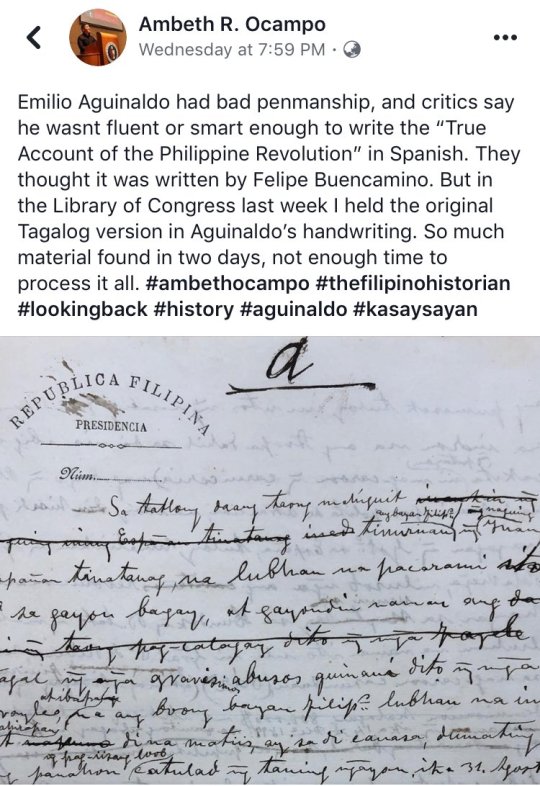
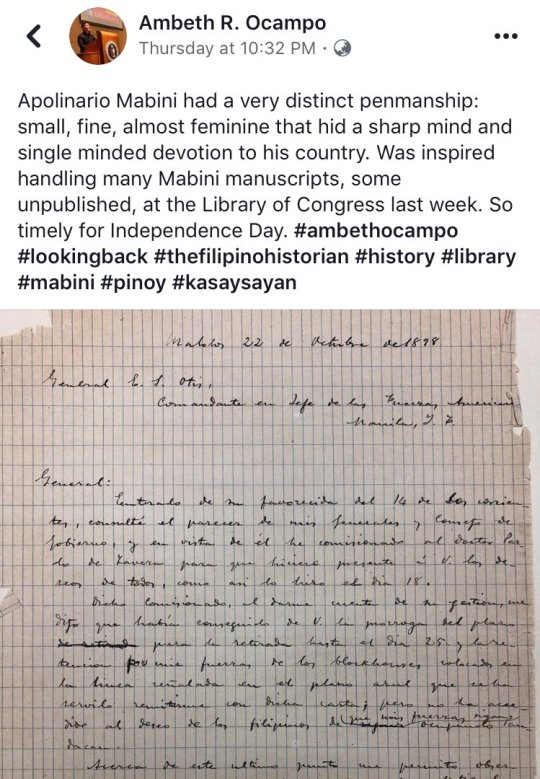
this is from my fav author in facebook Ambeth Ocampo
( I WOULD LIKE TO MEET HIM SOMEDAY FGGDFS)
So basically, its just a simple headcannon
But Everytime that Miong writes, Pole slowly checks by time and if its really bad, Pole just finishes all over again while Miong is asleep
"Can I check your work Mr. President?"
"*blushes* w-why?"
"sige na, why do you seem so red then"
I NEED CONVERSATIONS LIKE THESE ON HISTORY BOOKS PLEASE
#mabinaldo#monepy#143zanabi#bayaniserye#epy quizon#heneral moon#mon confiado#headcanon#please its been a long time#I HAVE BEEN BUSY WITH SCHOOL SOO YEAH#I literally love monepy and mabinaldo
27 notes
·
View notes